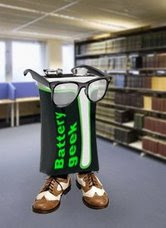Batteries Plus is offering buy 1 get 1 on all camcorder and camera batteries. Don't miss out this incredible deal!
Wednesday, April 30, 2008
Friday, April 11, 2008
Are lead acid batteries recycleable?
Yes. Lead acid batteries are the most commonly recycled product in the world! The lead in the battery is re-used in new batteries. The plastic containers and covers of old batteries are neutralized, reground and used in the manufacture of new battery cases. The electrolyte can be processed for recycled waste water uses. In some cases, the electrolyte is cleaned and reprocessed and sold as battery grade electrolyte. In other instances, the sulfate content is removed as Ammonia Sulfate and used in fertilizers. The separators are often used as a fuel source for the recycling process.
How do I dispose of batteries?
All rechargeable batteries must be disposed of properly, through approved recycling facilities. Rechargeable battery types include; NiCd, NiMH, Li Ion, and Lead Acid (Pb). Batteries Plus is associated with EPA recognized recycling facilities for proper recovery and re-use of battery components. Locate your nearest Batteries Plus store for best recycling options. Be environmentally conscious. Recycle your batteries.
Wednesday, April 9, 2008
What is a Deep Cycle battery?
Deep cycle batteries are designed for multiple, extended discharge/charge cycles. Deep cycle batteries can be discharged as much as 80% time after time and fully recover. This term generally refers to lead-based batteries designed with thicker lead plates than a standard automotive battery. Deep Cycle batteries provide outstanding performance in marine, RV, wheelchair/mobility and security applications.
Why use Rechargeable Lithium Ion batteries?
Li-ion (lithium ion) batteries use lithium compounds which are much more stable than the elemental lithium used in non rechargeable lithium batteries. A lithium battery should never be recharged while lithium-ion batteries are designed to be recharged hundreds of times. Rechargeable Lithium Ion batteries have a higher energy density than most other types of rechargeables. This means that for their size or weight they can store more energy than other rechargeable batteries. They also operate at higher voltages than other rechargeables, typically about 3.7 volts for lithium-ion vs. 1.2 volts for NiMH or NiCd. This means a single cell can often be used rather than multiple NiMH or NiCd cells. Lithium-ion batteries also have a lower self discharge rate than other types of rechargeable batteries. This means that once they are charged they will retain their charge for a longer time than other types of rechargeable batteries. NiMH and NiCd batteries can lose anywhere from 1-5% of their charge per day, (depending on the storage temperature) even if they are not installed in a device. Lithium-ion batteries will retain most of their charge even after months of storage.
Subscribe to:
Comments (Atom)
